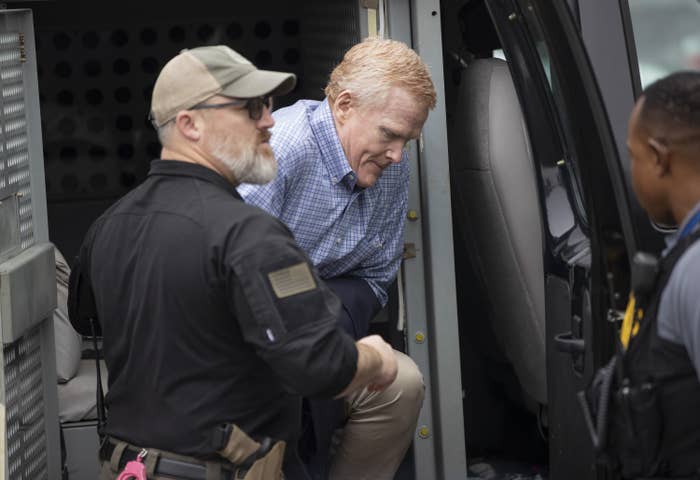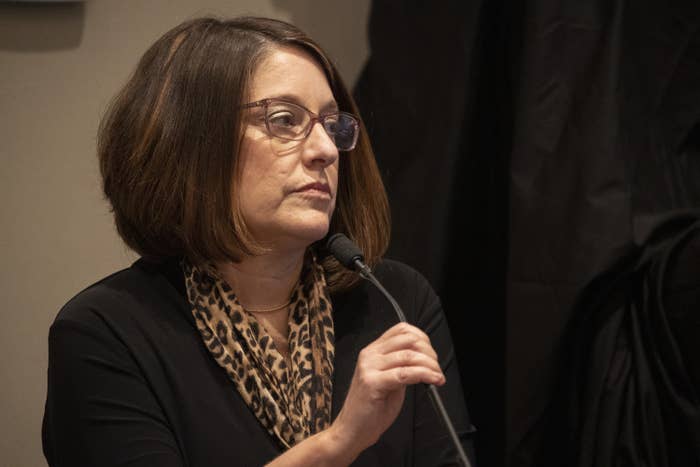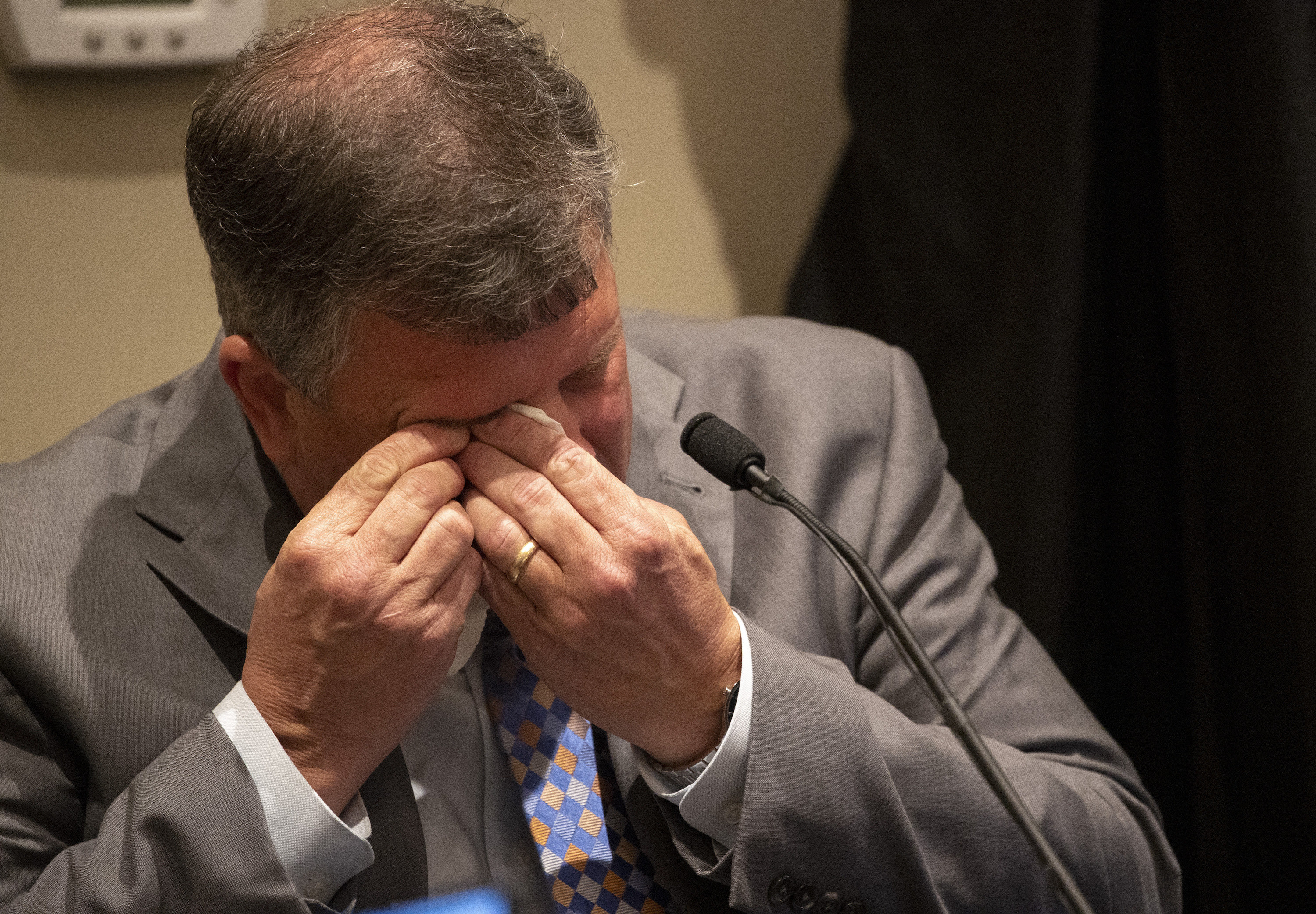
Less than 12 hours before Alex Murdaugh’s wife and son were shot dead in 2021, the chief financial officer of the South Carolina law firm where he worked confronted him about a huge sum of money that was missing from the company's accounts.
“He gave me a very dirty look,” Jeanne Seckinger, the CFO, testified at Murdaugh’s murder trial in the Colleton County courthouse on Thursday. “Not a look I’d ever received from Alex. Just a kind of frustrated-with-me look.”
In the days prior, Seckinger had grown suspicious about the $792,000 in fees that her staff could not locate, which Murdaugh had assured her was sitting in an accessible account.
On June 7, 2021, she said, she climbed the stairs to his second-floor office and closed the door to speak candidly with him. She had come to believe that Murdaugh, whom she’d known for decades since she was in high school, had stolen the money by arranging for it to be paid to himself directly instead of the firm. “I told him I had reason to believe he had received those funds himself and I needed proof that he had not,” Seckinger testified.
Then, two things happened.
The first was a phone call that interrupted Seckinger’s showdown with Murdaugh. He received a call informing him that the health of his father, a former partner at the firm and powerful local prosecutor, had devolved and he now lay dying in a Savannah hospital.
“That changed the mood of that conversation. We quit talking about business,” Seckinger said, recalling how the meeting immediately ended and Murdaugh left.
The second occurred hours later, when Seckinger received a call around 2 a.m. from an associate informing her that Murdaugh’s wife and son had been shot dead by an unknown assailant at their rural hunting lodge. Horrified, law firm staff closed the practice for a week, with Seckinger deciding any questions about missing funds could be delayed until the end of the year at the latest, when accounts would need to be settled.
“Alex was distraught and upset and not in the office much. Nobody wanted to harass him about nothing that we thought was really missing,” she said. “We had several months until the end of the year to clear it up, so we were not going to harass him at that point in time.”
That, prosecutors have said, was exactly Murdaugh’s plan when he allegedly decided to shoot wife Maggie and son Paul around 9 p.m. that night. Fearing his financial misdeeds were set to be exposed by the firm — and by a civil discovery hearing scheduled later that week in a lawsuit over a fatal boat crash involving his son — Murdaugh believed he was about to lose his job, his law license, and his freedom, prosecutors said. He needed to buy himself time — and sympathy.
“All of this going on in his life, which is a stellar series of events like nothing ever seen, is certainly relevant for the jury to consider when they consider whether there was a perfect storm that was arriving for this man on June 7,” lead prosecutor Creighton Waters told the judge on Thursday.
Except the jury was not present for Seckinger’s testimony.
Judge Clifton Newman had ruled earlier in the day that prosecutors could begin calling witnesses to testify about Murdaugh’s alleged financial crimes — and thus his alleged motive for murder — because defense attorneys had questioned a longtime Murdaugh family friend about whether they believed he could have had any reason to kill. But the judge has yet to decide exactly what evidence the jury will hear about the 99 charges of financial crime that Murdaugh is also facing or in what manner it will be presented to them.
This had the somewhat unusual outcome of creating, in effect, two trials for Murdaugh on Thursday: one in which the jury was present for about 90 minutes to hear investigators give evidence about the murder scene, and a second in which the jury was not present as witnesses gave evidence about the alleged financial thefts.
It is yet to be determined exactly what the jury will hear from this second strain of evidence and if these witnesses will be called back to testify again in front of the jury.

A rule of South Carolina’s criminal procedure prohibits evidence of other crimes or wrongs being introduced in court. Such evidence may only come up if it’s used to show intent or motive, not merely as evidence of bad character.
The judge said either the defense and prosecution need to agree on how to admit the financial evidence without drastically lengthening the trial’s duration (Murdaugh’s lawyers had argued this could add at least two weeks to the case) or he will make a ruling, most likely on Friday.
Prosecutors have insisted they are not simultaneously working to try Murdaugh on the financial crimes as they try him on the murder charges, but they say they’re intrinsically linked. “The state’s intent is not to try 100 white-collar cases in the context of this murder case,” Waters said. “It’s only to explain to the jury enough of what was going on — an unfathomable set of events for a lawyer — what was going on in his life that was all coming to a head on June 7.”
In her testimony on Thursday, Seckinger described how she and other law firm staff eventually discovered that Murdaugh had been stealing from multiple clients and the firm itself for over a decade. He allegedly did this in part by setting up a bank account with the same name as the consulting group the firm normally used to receive client payments or attorney fees and then misappropriated these funds to himself.
Seckinger explained that in May 2021, she had noticed Murdaugh had been trying to structure legal fees he’d received from a case in an unusual manner. She said he told her that he was “trying to put some money in Maggie’s name” to shield it from discovery in the boat crash lawsuit.
She and other partners at the firm did not yet believe Murdaugh was stealing money, but they were concerned that he was trying to skirt the law and hide income. “That would be wrong, and we did not want any part of that,” she said.
Later that month, she became aware of the missing $792,000, which eventually prompted the closed-door meeting in his office on June 7.
Chris Wilson, an attorney at another firm and longtime friend of Murdaugh's, had worked with him on that case, in which his share of the legal fees amounted to $792,000. He testified Thursday that in March 2021, Murdaugh had asked him to make the check out to him directly, rather than the firm, so he could use the money to purchase an annuity with his firm’s blessing.
“It was different, but it didn’t raise any red flags or suspicions to me that anything wrong was going on,” Wilson testified.
“Because you trusted your friend?” Waters asked.
“Very much,” Wilson said.
But Seckinger said that the same afternoon she had confronted him about the missing money, she received a phone call from Murdaugh, who was still working in the office and inquiring about his 401(k) balances as part of preparations for the upcoming boat crash hearing. “I was surprised he was in the building working on it,” she said. “I thought he left to go deal with his father.”
Wilson told the court that the month after the killings Murdaugh had told him he had “messed up” and could not structure the fees as he thought he’d be able to. He paid back $600,000 to Wilson’s trust and asked his friend to temporarily cover the remaining $192,000, which he said had been tied up in an annuity. Wilson agreed to do so, but later had his friend sign a promissory note pledging repayment. He wanted this agreement in writing, he said, because he was worried Murdaugh might kill himself.

Seckinger said that in July she was sent an email from Murdaugh and Wilson claiming the $792,000 was in the trust and could be sent whenever convenient. That assurance temporarily ended her inquiry, Seckinger testified, because there had been a long “history of trust and brotherhood” in the firm that previously allowed Murdaugh to pay back money that he had wrongly received — he always said it was by mistake — and others simply moved on.
But in early September 2021, Seckinger decided to double-check accounts and discovered more irregularities involving a series of checks that Murdaugh had signed over to his fake company.
Firm leadership, including Murdaugh’s older brother Randy, convened a meeting for Friday, Sept. 3, to discuss the matter. Seckinger said Randy agreed it looked like Murdaugh had stolen and would need to be immediately confronted. She said she heard that Murdaugh had admitted to the thefts and agreed to resign. Due to a wedding and the Labor Day weekend holiday, senior law firm staff decided they would consult with ethics attorneys and announce Murdaugh’s resignation on Monday, Sept. 6.
But that Saturday, the day after Murdaugh agreed to resign, Seckinger again received a shocking phone call, this time informing her that Murdaugh had been shot in the head by the side of a rural road. “Fear went through [the firm],” Seckinger said. “Was this retaliation? Was he involved in something bigger that was going to get more of us in trouble? [There was] just fear.”
The shooting only injured Murdaugh superficially, though, and in mid-September, authorities arrested Curtis “Eddie” Smith, a distant cousin and former client of Murdaugh’s, whom they said Murdaugh had asked to kill so that his surviving son, Buster, could collect a $10 million insurance payout. Murdaugh was subsequently charged with insurance fraud.
The morning before the roadside shooting, Wilson had visited Murdaugh to confront him about his resignation and the alleged theft. Wilson said Murdaugh broke down crying as he told him he’d stolen from him and others to fund a 20-year drug addiction. “I was so mad,” Wilson said. “I had loved the guy for so long, and I probably still love the guy a little bit, but I was so mad.”
Hours later, he too received a call about Murdaugh having been shot. “What the devil’s going on?” Wilson recalled thinking. “I thought he tried to kill himself.”
Waters, the prosecutor, told the judge that the jury needs to hear evidence about the roadside shooting because it goes to Murdaugh’s supposed motive. “Everyone immediately assumes the bad guys are back,” Waters said. “There’s a symmetry between what happens on the side of the road and what happens on June 7, because when the hounds are at the door, when Hannibal is at the gates for Alex Murdaugh, violence happens.”
Griffin, the defense attorney, countered that there was no financial reason for Murdaugh to kill his wife and son, arguing the prosecution’s case was grounded in theory, not facts. “They’ve got a whole lot more evidence about financial misconduct than they have about a murder, and that’s what this is all about,” Griffin said.
At several points in his testimony, Wilson grew visibly emotional as he recounted how his longtime friend had behaved. “He was one of my best friends. I thought he was and I thought he felt the same way about me,” Wilson said. “I don't know how I feel now.”
